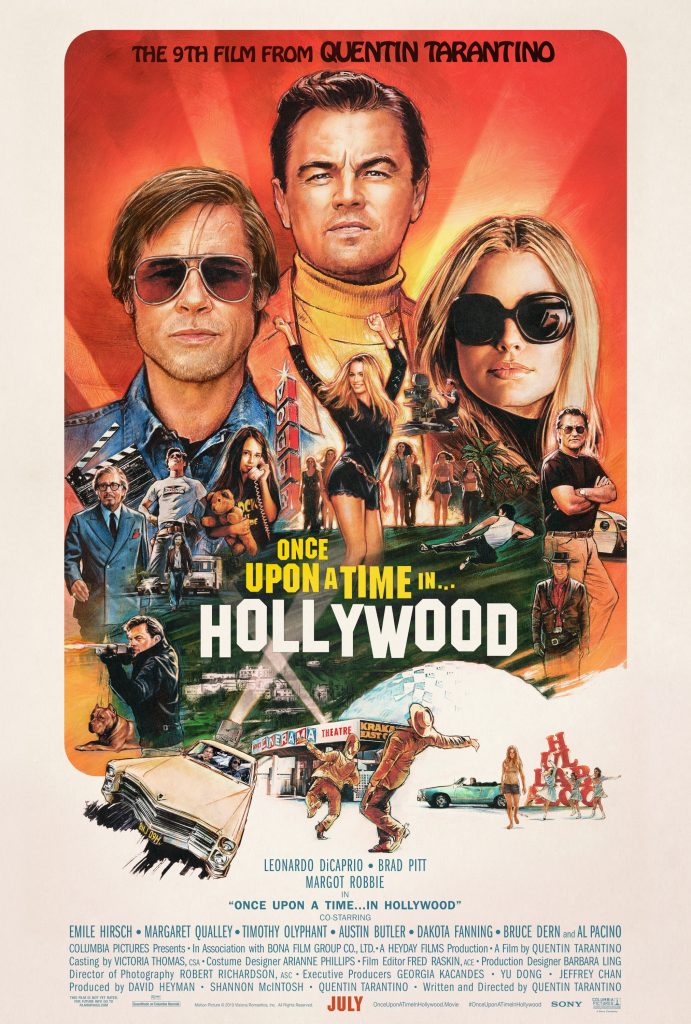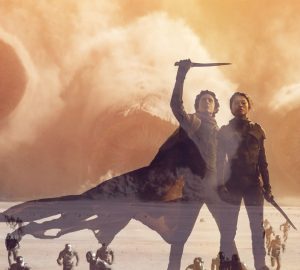‘Once Upon a Time in Hollywood,’ a human, heartfelt trip back in time

Famed writer and director Quentin Tarantino takes summertime audiences back in time yet again for his 9th film, “Once Upon a Time in Hollywood.” With the massive influence Tarantino has left on cinema and filmmakers everywhere, how does the latest entry in his filmography match up? The film tells the story of Rick Dalton, an out-of-touch and alcoholic actor, and his loyal stunt man, Cliff Booth, as the two men attempt to make the very best of the fading days of classic Hollywood.
“Once Upon a Time in Hollywood” may be the most unTarantino-like Tarantino film, yet it simultaneously embraces everything the director loves and is known for in a way that is sure to surprise fans. Most of the film’s events takes place over the course of a day and a half and relies on numerous long and dialogue heavy scenes. This may not come as shock to those familiar with his works, but Tarantino taps into this sensibility even further by making the film’s plot itself almost non-existent and very restrained. For some, this may prove annoying, given the film’s nearly three hour runtime. But for those willing to give this idea a chance, “Once Upon a Time” becomes not only one of the director’s best, but easily the most personal and organic feeling of his works yet.
Through the pop-culture heavy dialogue, vibrant production design and the blaring radio shooting out a swinging 60s soundtrack, the film practically drowns the audience into its time period. There is an obvious sentimentality that permeates the film, yet Tarantino’s snappy and atmospheric direction elevates this feeling with an unmistakable authenticity that keeps the film from feeling overly sappy. In every spit, tire squeal, beer slurp, smoker’s cough and gruff yell, there is a human energy that oozes from every frame that keeps the experience masterfully grounded.
Despite the looseness of the story, there are elements set up throughout that pay off at the end in some explosive ways. Without getting into spoilers, Tarantino’s twist on certain real life events is set up in very entertaining ways and truly ends things with a bang.
The film wouldn’t work half as well, however, if it weren’t for the powerhouse duo of Leonardo DiCaprio and Brad Pitt, who give some of the best performances of their careers here. DiCaprio gives Rick Dalton a grungy and human side that prevents the actor from accomplishing great things which, combined with the changing times, leads to frustrating moments that anyone not wanting to give up on the past can relate to. Brad Pitt has an effortlessly cool swagger whenever on screen and proves to be insatiably likable in the loyalty he presents to those close to him. The variety of supporting characters, from Margot Robbie’s bubbly turn as Sharon Tate all the way to Bruce Dern as a grumpy movie ranch owner, play their parts with equal charisma that further helps bring the time period to life.
The only noteworthy flaw for the film is that its transition between the second and final act felt weakly executed. The movie makes a significant time jump at one point, leading an extended sequence of narration. While Tarantino’s use of narration in the past has drawn some mild criticism, here it goes on for way too long and narrates over tiny details that feel unnecessary to go over, while also halting Rick’s arc from being fully realized.
Other than this gripe, “Once Upon a Time in Hollywood” is possibly the closest Tarantino has come to making another “Pulp Fiction.” It’s great to know that after nearly 30 years in the industry, Tarantino can still surprise audiences who feel like they know him inside and out. Fans of his movies should go into this with very open minds, as this entertaining and heartfelt experience is truly like no other.
Review overview
Summary
9.8A fantastic and cleverly nostalgic throwback to this long-gone era, "Once Upon a Time in Hollywood" shows Tarantino at his best and most mature as a filmmaker.




















